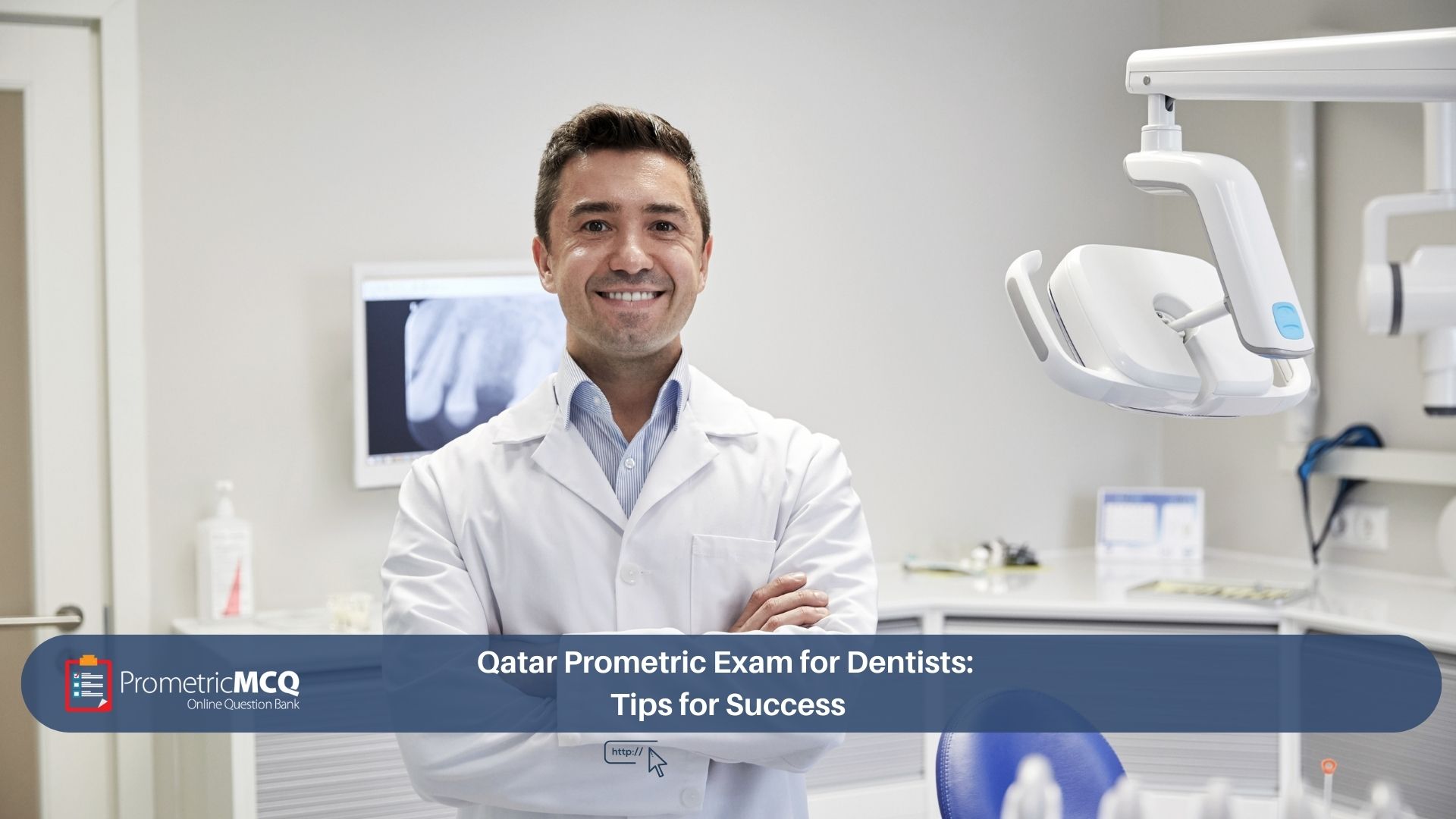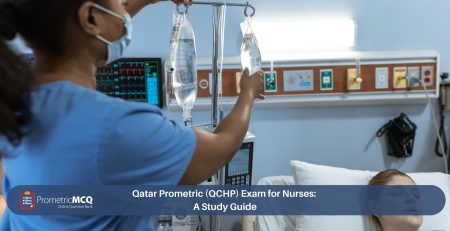
Qatar Prometric Exam for Dentists: Tips for Success
fatima@prometricmcq.com2025-09-26T18:57:37+00:00Table of Contents
ToggleQatar Prometric Exam for Dentists: Tips for Success (2025)
With its visionary approach to healthcare and state-of-the-art facilities, Qatar has firmly established itself as a leading destination for ambitious dental professionals. The opportunity to practice in a dynamic, multicultural environment is a powerful draw, but it is protected by a rigorous quality assurance process. The cornerstone of this process is the Qatar Council for Healthcare Practitioners (QCHP) licensing exam for dentists. This Prometric-administered test is a comprehensive evaluation of a dentist’s clinical knowledge, diagnostic skills, and ability to make sound, evidence-based decisions.
The QCHP exam is not a simple test of factual recall; it is an advanced assessment of clinical reasoning. The Multiple-Choice Questions (MCQs) are almost exclusively case-based, designed to mimic the complexities of daily dental practice. To succeed, candidates must move beyond passive learning and adopt a strategic, active approach to their preparation. This involves not only mastering the core dental sciences but also developing the speed and accuracy needed to excel in a timed, high-stakes environment.
This ultimate 2025 guide provides a definitive roadmap to conquering the QCHP dental exam. We will dissect the exam’s structure, offer a detailed breakdown of high-yield topics, and present proven tips for success. This guide is enriched with sample MCQs with in-depth rationales to hone your analytical skills and a comprehensive 10-point FAQ section to demystify every aspect of the process. Our goal is to equip you with the knowledge, strategy, and confidence needed to pass your exam and begin your dental career in Qatar.
Key Takeaways for QCHP Dental Exam Success
- It’s a Clinical Reasoning Test: The exam prioritizes your ability to diagnose conditions and formulate treatment plans based on clinical scenarios.
- Radiographic Interpretation is Key: You must be highly proficient in interpreting a variety of dental radiographs, as many questions are image-based.
- Master the Fundamentals: A rock-solid foundation in Operative Dentistry, Endodontics, and Oral Surgery is essential, as these are heavily weighted areas.
- Practice is Paramount: The most effective preparation method is to solve thousands of high-quality, case-based MCQs from a reputable question bank.
- Time Management is a Skill: With just over a minute per question, developing an efficient test-taking rhythm through timed mock exams is crucial for success.
Deconstructing the 2025 QCHP Exam Pattern for Dentists
A successful campaign starts with knowing the battlefield. The QCHP exam for dentists follows a globally recognized, standardized format. Understanding this structure is the first step in effective QCHP Qatar Prometric exam preparation.
1. Test Administrator and Format
The exam is a Computer-Based Test (CBT) administered at secure Prometric centers worldwide.
- Structure for General Dentists: 150 MCQs.
- Duration: 3 hours (180 minutes).
This format demands both speed and accuracy, leaving no room for indecision.
2. Scoring and Outcome
The result is a straightforward Pass/Fail. The QCHP does not provide a numerical score. The unofficial passing standard is generally understood to be around 60-65%. Critically, there is no negative marking, so a response should be provided for every question.
3. Question Style: The Clinical Vignette
Expect nearly every question to be a clinical scenario. You’ll be presented with a patient’s history, clinical findings, and often a radiograph or clinical image. You must then choose the single best answer regarding diagnosis, treatment, or management.
High-Yield Syllabus Topics: A Strategic Study Blueprint
The QCHP syllabus is vast, but an intelligent study plan focuses on the most frequently tested topics. Allocate your study time proportionally to these core domains of general dentistry.
| Dental Domain | High-Yield Topics and Key Concepts for 2025 |
|---|---|
| Operative Dentistry & Dental Materials | This is a cornerstone. Master G.V. Black’s principles, caries diagnosis, adhesive dentistry protocols, and the properties of materials like composite resins (polymerization shrinkage, fillers, bonding agents), amalgam, and glass ionomers. |
| Endodontics | Diagnosis of pulpal and periapical diseases is key. Know your root canal anatomy, principles of access and instrumentation, obturation materials and techniques, management of dental trauma (e.g., avulsion, fractures), and endodontic emergencies. |
| Oral Surgery & Local Anesthesia | Be proficient in routine and surgical extractions, management of impacted third molars, and post-operative complications (e.g., dry socket, bleeding). Local anesthesia is a major topic: know your anatomy (nerve blocks), pharmacology, and how to manage complications like toxicity or nerve injury. |
| Prosthodontics (Fixed & Removable) | Principles of tooth preparation for various crown types, impression materials, cements, and pontic design. For removable prosthodontics, understand the principles of complete denture fabrication and the design of removable partial dentures (RPDs). |
| Periodontics | Classification of periodontal diseases, diagnosis (probing depths, bleeding on probing, furcation involvement), non-surgical therapy (scaling and root planing), and indications for surgical intervention. |
| Pediatric Dentistry & Orthodontics | Focus on the management of caries in the primary dentition, pulp therapy (pulpotomy), space maintenance, and behavior management. For orthodontics, know Angle’s classification and be able to identify basic malocclusions that require referral. |
| Oral Pathology, Medicine & Radiology | This is a highly visual section. You must be able to interpret radiographs to identify common cysts, tumors, and periapical pathology. Be able to recognize common oral mucosal lesions (e.g., lichen planus, candidiasis) and know the oral manifestations of systemic diseases. |
Top Tips for QCHP Exam Success
Beyond knowing the syllabus, success requires a strategic approach to studying and test-taking.
Tip #1: Adopt an MCQ-First Mindset
The most effective study method is active recall. Instead of passively reading textbooks for weeks on end, make a high-quality question bank your primary study tool. Solving thousands of MCQs forces you to actively retrieve information and apply it to clinical scenarios—the exact skills you need on exam day. Use textbooks as a reference to fill in the knowledge gaps revealed by the QBank.
Tip #2: Become a Radiograph Expert
A significant portion of the QCHP exam is visual. You must be comfortable and quick in interpreting dental radiographs. Practice by systematically reviewing hundreds of images. For every radiograph, train yourself to check for caries, assess alveolar bone levels, examine the periapical areas for any abnormalities, and identify key anatomical landmarks. This systematic approach will prevent you from missing critical diagnostic information.
Tip #3: Master the “Art” of the Rationale
When using a QBank, the real learning is in the explanations. For every single question, you must understand not only why the correct option is right, but also why every other incorrect option (the distractors) is wrong. This process builds a deep, nuanced understanding of the subject matter and trains you to differentiate between very similar answer choices, a common feature of difficult exam questions.
Tip #4: Simulate the Real Exam Conditions
Mental endurance is a skill that must be trained. A 3-hour, 150-question exam is a marathon. Starting at least a month before your exam, you must take regular, full-length mock exams under strict, timed conditions. This will perfect your pacing, build your stamina, and help you develop a strategy for handling difficult questions without losing time. Walking into the Prometric center should feel like a familiar routine.
Frequently Asked Questions (FAQs) for the QCHP Dental Exam
The exam is graded Pass/Fail, and the QCHP does not publish an official passing percentage. The consensus among past candidates is that the passing threshold is around 60-65%. To ensure you pass comfortably, you should aim to score consistently above 70% in high-quality mock exams.
All three are Prometric-administered, case-based MCQ exams based on international standards. The core content is very similar. A candidate who is well-prepared for one of these exams is generally well-prepared for the others. The primary differences lie in the administrative and licensing procedures of each health authority.
Primary Source Verification (PSV) is a mandatory credential-checking process. The DataFlow Group will contact your university and previous licensing bodies to verify the authenticity of your documents. A positive DataFlow report is required by the QCHP before they will issue your final Qatar QCHP license to practice.
The exam is based on international, evidence-based standards of care. You should be familiar with guidelines from major international bodies like the American Dental Association (ADA) or the FDI World Dental Federation. You will not be tested on specific local Qatari regulations. You can find many of these international guidelines on the ADA’s Oral Health Topics page.
No. The exam uses only generic names for all materials and pharmaceuticals. You need to know the class and properties of a material (e.g., “vinyl polysiloxane” not “Aquasil”) or a drug (e.g., “ibuprofen” not “Advil”).
The QCHP typically allows candidates three attempts to pass the licensing exam. After a third failure, there may be a waiting period or a requirement for additional training before you are eligible to re-apply. Always check the official QCHP website for the latest policies.
While all domains are important, a deep mastery of diagnosis is the single most critical skill. This includes clinical diagnosis, differential diagnosis, and, most importantly, radiographic diagnosis. If you can accurately interpret clinical signs and radiographs to arrive at the correct diagnosis, you are well on your way to passing.
Do not cram. The day before the exam is for consolidation and relaxation. Do a light review of your summary notes or flashcards, but spend most of the day relaxing. Ensure you eat a good meal, hydrate well, and get a full night of sleep. Your goal is to arrive at the Prometric center mentally fresh and calm.
The only essential document is your original, valid passport. The name on your passport must be an exact match to the name on your exam registration. Digital copies or other forms of ID are not accepted.
The best resources are comprehensive, up-to-date question banks that specialize in Gulf healthcare licensing exams. These platforms offer thousands of case-based MCQs with detailed rationales that accurately simulate the real exam. A dedicated platform with specific Dentistry MCQs is your most powerful study tool.
Conclusion: Your Future in Qatar’s Dental Sector
The Qatar Prometric (QCHP) exam for dentists is a rigorous but fair measure of your clinical expertise. It is a challenge that rewards strategic preparation, critical thinking, and a deep commitment to evidence-based practice. By understanding the exam’s pattern, focusing on high-yield topics, and dedicating yourself to an active, MCQ-based study plan, you can confidently overcome this hurdle. Passing the QCHP exam is the definitive step toward a professionally and personally rewarding dental career in one of the world’s most dynamic and forward-thinking nations.
Ready to Build Your Confidence and Ace the QCHP Exam?
Our comprehensive MCQ package for dentists is tailored for the Qatar Prometric exam, featuring thousands of high-yield questions, detailed rationales, and simulated exams to build your knowledge and guarantee your success.




